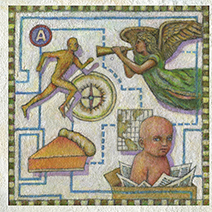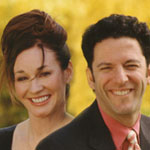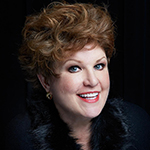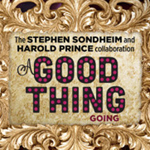David Hajdu
Waiting for the Angel
(Miranda Music)
November 20, 2015
Reviewed by Victoria Ordin for Cabaret Scenes
 Waiting for the Angel, the first collection of songs by award-winning music critic and Columbia journalism professor David Hajdu (and collaborators), is aptly titled. Currently writing for The Nation, Hajdu was at Entertainment Weekly in the 1990s and his work has appeared in The New York Times Magazine, New York Review and Vanity Fair. He published Lush Life: A Biography of Billy Strayhorn, in 1997, and wrote insightfully about the Greenwich Village folk scene of the 1960s in his 2011 Positively 4th Street. Both were finalists for the National Book Critics Circle Award.
Waiting for the Angel, the first collection of songs by award-winning music critic and Columbia journalism professor David Hajdu (and collaborators), is aptly titled. Currently writing for The Nation, Hajdu was at Entertainment Weekly in the 1990s and his work has appeared in The New York Times Magazine, New York Review and Vanity Fair. He published Lush Life: A Biography of Billy Strayhorn, in 1997, and wrote insightfully about the Greenwich Village folk scene of the 1960s in his 2011 Positively 4th Street. Both were finalists for the National Book Critics Circle Award.
In interviews about the album featuring Broadway veteran Michael Winther and well-known performers Jill Sobule, Jo Lawry, and his wife, Karen Oberlin, Hajdu acknowledges the risk of writing his own songs after so many years writing about the songs of others.
Sobule helped Hajdu overcome his reticence: “If thinking about songs day and night isn’t a calling, I don’t know what is.” Lovers of witty, challenging lyrics and wistful, if sometimes grim, melodies are in Sobule’s debt for her encouragement.
Lawry’s gentle, clear voice hits the high notes with grace and ease in the opening track, “Who Do You Belong To?” (music: Renee Rosnes). The opening lyrics evoke an almost quaint desolation—”Bright silver diner/On Route 22/Next to the storage place/I go after school”—within which the speaker’s longing unfolds, and finally comes to rest, in the song’s conclusion: “I belong to me.
” Longing runs through much of the album, whether the songs are reflective and slow—“The Angel in the Attic” (vocal: Oberlin; music: Sobule)—or whimsical and uptempo—“Donna the Astronomer” (a great duet with Winther and Oberlin; music: Rosnes) and “Bad Idea” (vocal: Winther; music: Sobule). Faintly hopeful notes are struck in the beautiful “Lullaby for Nathan Charles” (vocal: Oberlin; music: Michael Leonard) and “Good Things Happen Slowly” (vocal: Lawry; music: Fred Hersch). Tedd Firth’s piano melds seamlessly with the voices of three quite different female vocalists, nowhere more poignantly than on his arrangement of “The Girl in the Grocery Box” (vocal: Lawry; music: Sobule), about a girl who can’t be “contained” by conventional categories. The same might be said of Hajdu’s excellent songwriting debut.





